人教版高中英语选修10 Unit 5 Enjoying novels Grammar 课件(31张PPT)
文档属性
| 名称 | 人教版高中英语选修10 Unit 5 Enjoying novels Grammar 课件(31张PPT) |
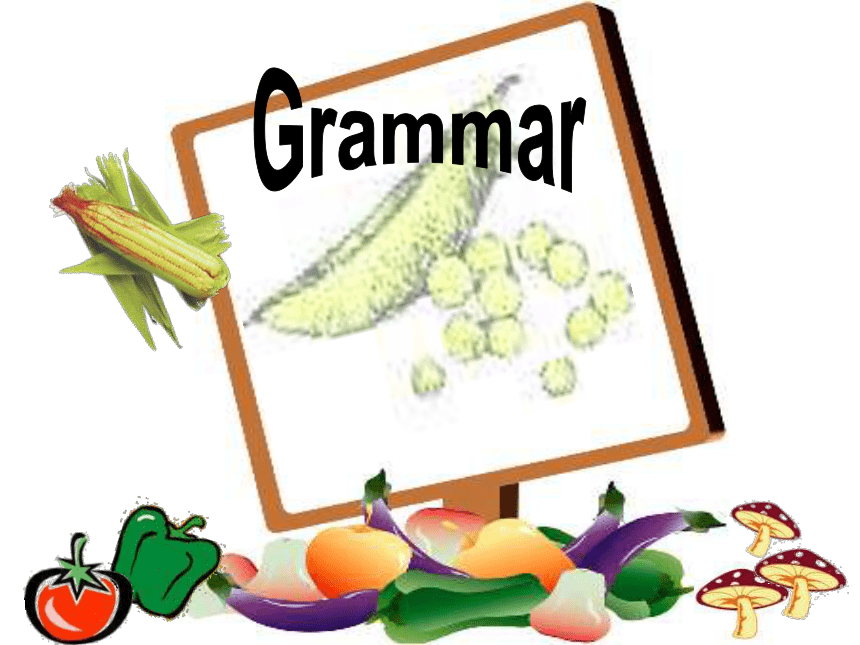
|
|
| 格式 | zip | ||
| 文件大小 | 1.7MB | ||
| 资源类型 | 教案 | ||
| 版本资源 | 人教版(新课程标准) | ||
| 科目 | 英语 | ||
| 更新时间 | 2020-07-01 08:10:33 | ||
图片预览

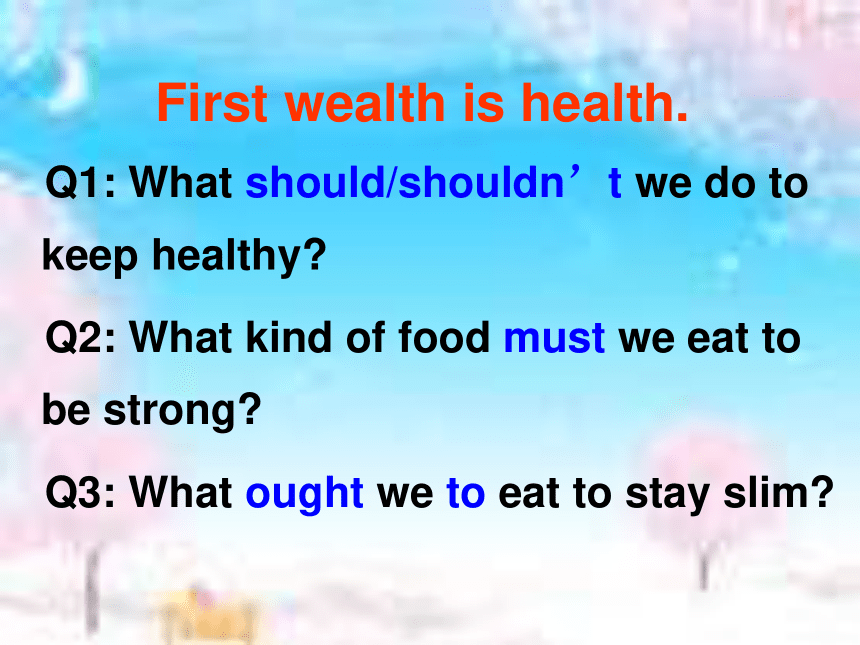
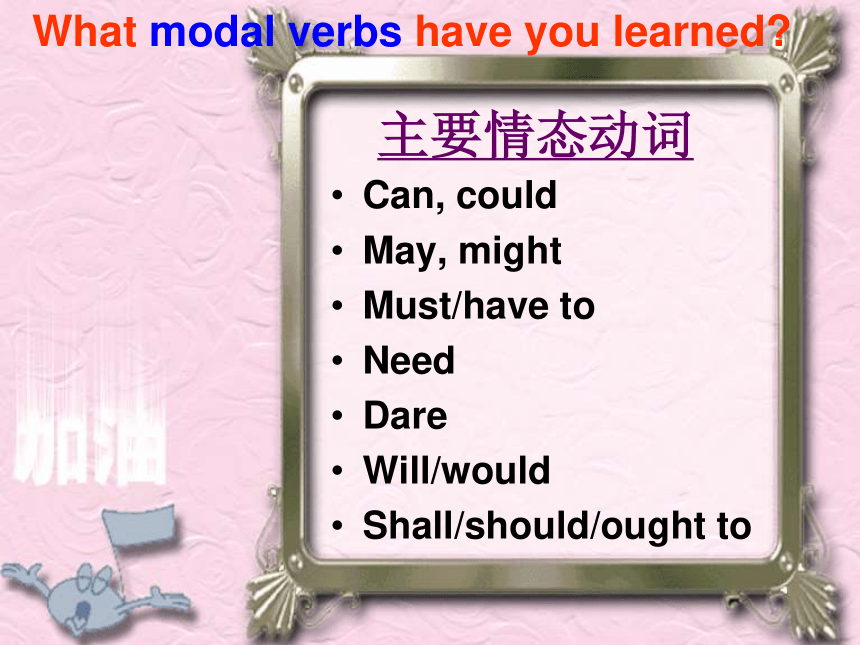
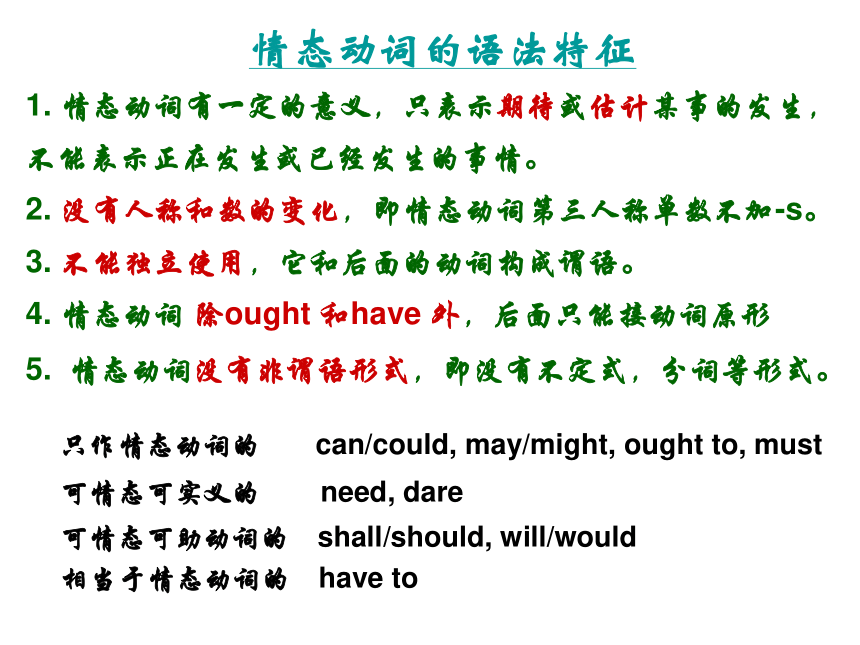
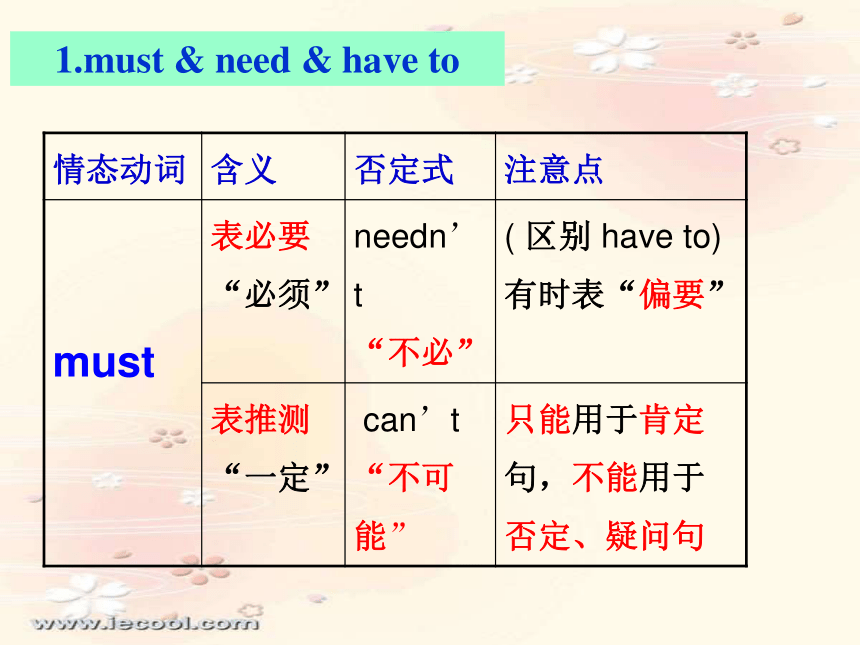
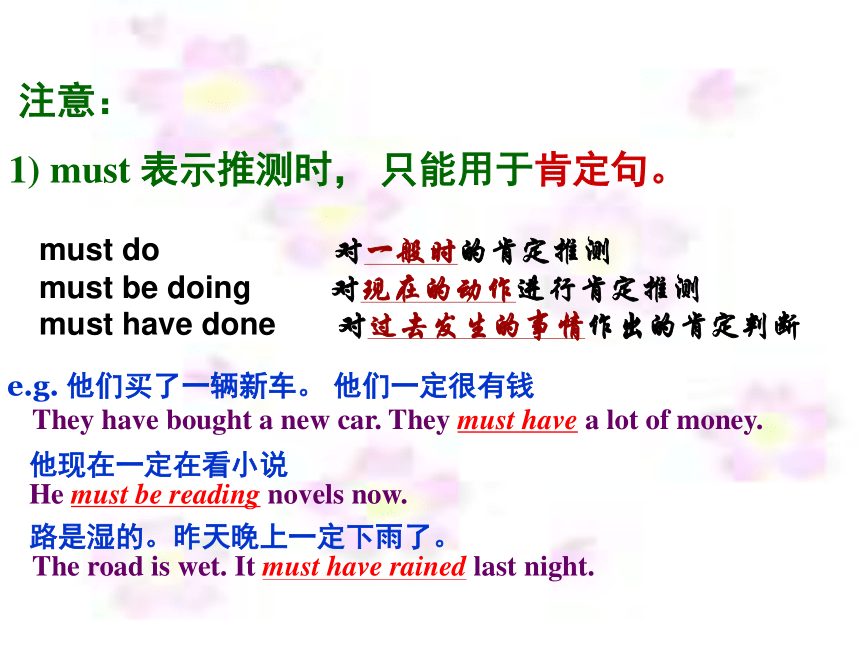
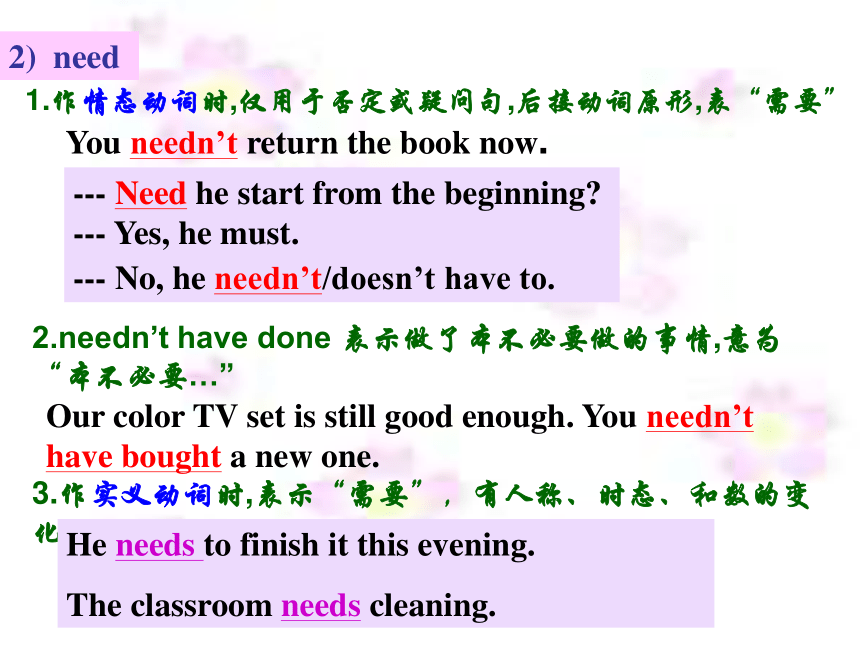
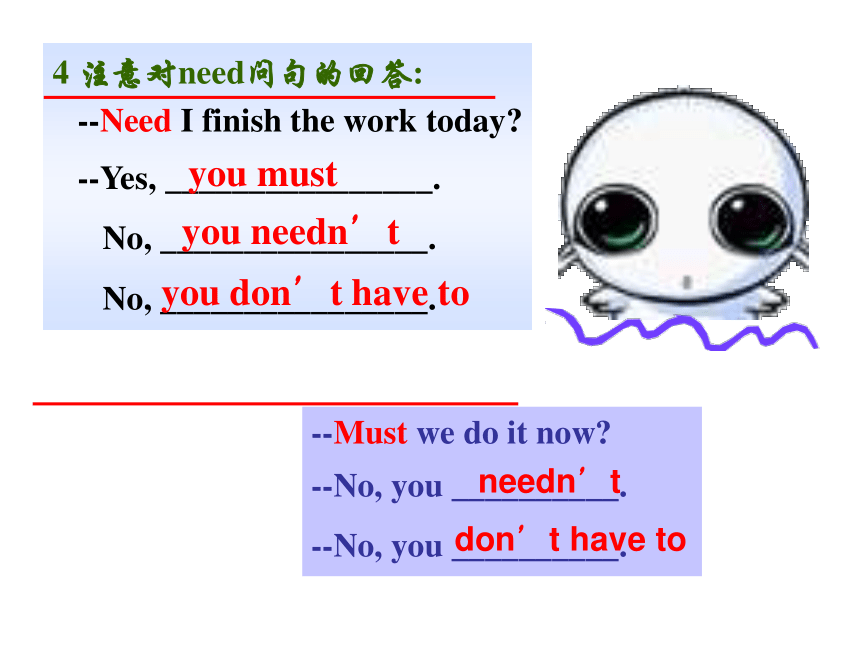
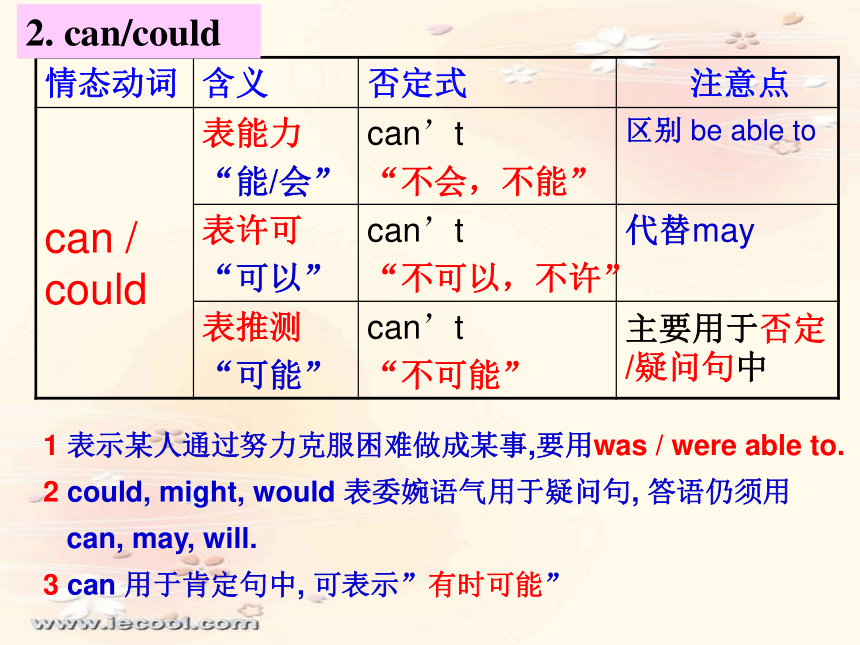
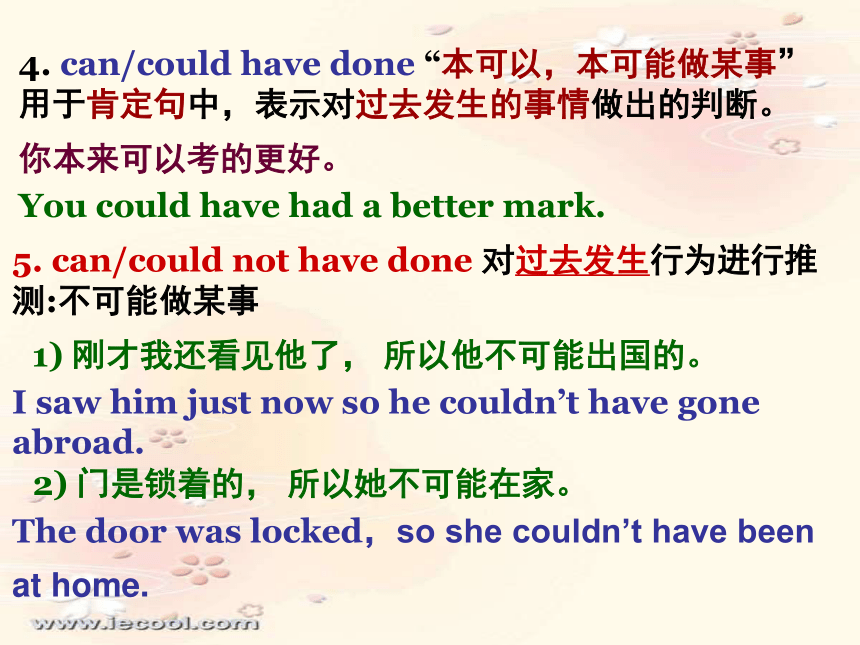
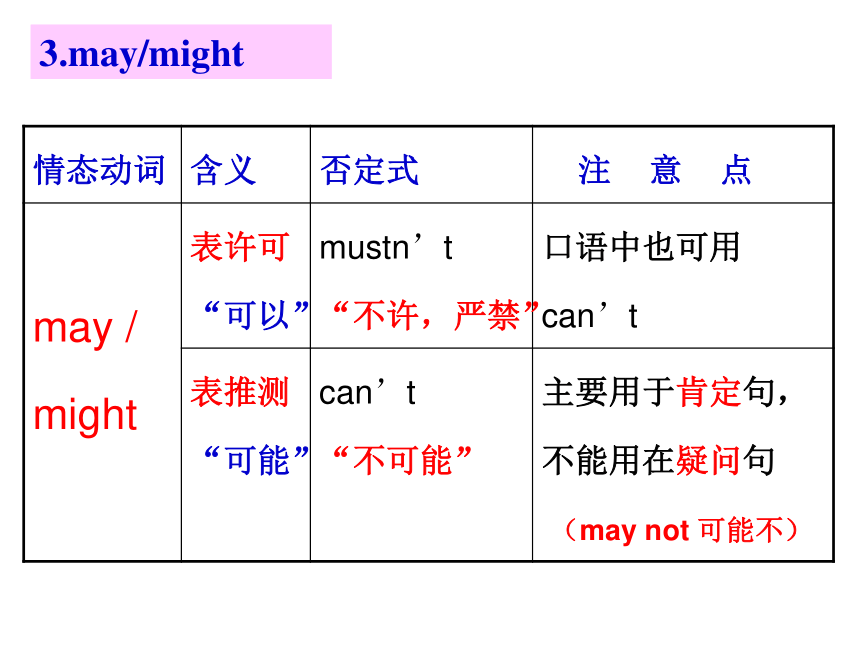
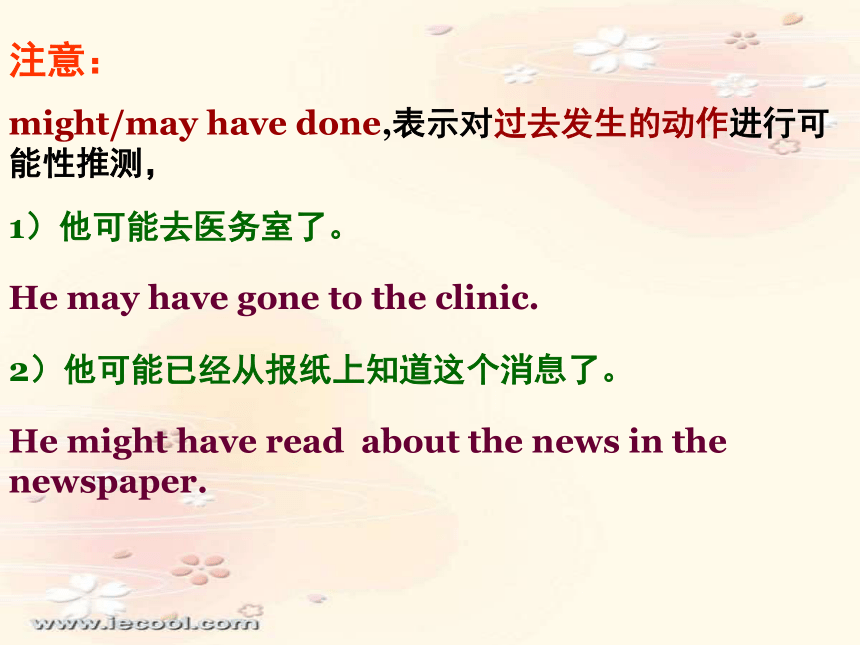
文档简介
(共31张PPT)
First
wealth
is
health.
Q1:
What
should/shouldn’t
we
do
to
keep
healthy?
Q2:
What
kind
of
food
must
we
eat
to
be
strong?
Q3:
What
ought
we
to
eat
to
stay
slim?
主要情态动词
Can,
could
May,
might
Must/have
to
Need
Dare
Will/would
Shall/should/ought
to
What
modal
verbs
have
you
learned?
1.
情态动词有一定的意义,只表示期待或估计某事的发生,不能表示正在发生或已经发生的事情。
2.
没有人称和数的变化,即情态动词第三人称单数不加-s。
3.
不能独立使用,它和后面的动词构成谓语。
4.
情态动词?除ought?和have?外,后面只能接动词原形
5.
?情态动词没有非谓语形式,即没有不定式,分词等形式。
只作情态动词的
can/could,
may/might,
ought
to,
must
可情态可实义的
need,
dare
可情态可助动词的 shall/should,
will/would
相当于情态动词的 have
to
情态动词的语法特征
1.must
&
need
&
have
to
情态动词
含义
否定式
注意点
must
表必要
“必须”
needn’t
“不必”
(
区别
have
to)
有时表“偏要”
表推测
“一定”
can’t
“不可能”
只能用于肯定句,不能用于否定、疑问句
注意:
1)
must
表示推测时,
只能用于肯定句。
must
do
对一般时的肯定推测
must
have
done
对过去发生的事情作出的肯定判断
must
be
doing
对现在的动作进行肯定推测
e.g.
他们买了一辆新车。
他们一定很有钱
They
have
bought
a
new
car.
They
must
have
a
lot
of
money.
他现在一定在看小说
He
must
be
reading
novels
now.
路是湿的。昨天晚上一定下雨了。
The
road
is
wet.
It
must
have
rained
last
night.
---
Need
he
start
from
the
beginning?
---
Yes,
he
must.
---
No,
he
needn’t/doesn’t
have
to.
1.作情态动词时,仅用于否定或疑问句,后接动词原形,表“需要”
2)
need
You
needn’t
return
the
book
now.
2.needn’t
have
done
表示做了本不必要做的事情,意为“本不必要…”
Our
color
TV
set
is
still
good
enough.
You
needn’t
have
bought
a
new
one.
3.作实义动词时,表示“需要”,有人称、时态、和数的变化
He
needs
to
finish
it
this
evening.
The
classroom
needs
cleaning.
4
注意对need问句的回答:
--Need
I
finish
the
work
today?
--Yes,
________________.
No,
________________.
No,
________________.
you
must
you
needn’t
you
don’t
have
to
--Must
we
do
it
now?
--No,
you
__________.
--No,
you
__________.
needn’t
don’t
have
to
1
表示某人通过努力克服困难做成某事,要用was
/
were
able
to.
2
could,
might,
would
表委婉语气用于疑问句,
答语仍须用
can,
may,
will.
3
can
用于肯定句中,
可表示”有时可能”
2.
can/could
情态动词
含义
否定式
注意点
can
/
could
表能力
“能/会”
can’t
“不会,不能”
区别
be
able
to
表许可
“可以”
can’t
“不可以,不许”
代替may
表推测
“可能”
can’t
“不可能”
主要用于否定/疑问句中
4.
can/could
have
done
“本可以,本可能做某事”
用于肯定句中,表示对过去发生的事情做出的判断。
你本来可以考的更好。
You
could
have
had
a
better
mark.
5.
can/could
not
have
done
对过去发生行为进行推测:不可能做某事
1)
刚才我还看见他了,
所以他不可能出国的。
I
saw
him
just
now
so
he
couldn’t
have
gone
abroad.
2)
门是锁着的,
所以她不可能在家。
The
door
was
locked,so
she
couldn’t
have
been
at
home.
3.may/might
情态动词
含义
否定式
注
意
点
may
/
might
表许可
“可以”
mustn’t
“不许,严禁”
口语中也可用can’t
表推测“可能”
can’t
“不可能”
主要用于肯定句,
不能用在疑问句
(may
not
可能不)
注意:
might/may
have
done,表示对过去发生的动作进行可能性推测,
1)他可能去医务室了。
He
may
have
gone
to
the
clinic.
2)他可能已经从报纸上知道这个消息了。
He
might
have
read
about
the
news
in
the
newspaper.
1.
---May
I
use
your
pencil?
---Yes,
you
may.
/
No,
you
mustn’t.
2.
She
may
not
be
working
now.
3.
John
might
be
at
home
now.
4.
Helen
may
go
on
the
trip
with
us,
but
she
isn’t
very
sure
yet.
5.
She
may
/
might
have
read
it
in
the
paper.
6.
He
may
not
have
finished
reading
the
book.
4.will/would
情态动词
用
法
will
表请求
(第二人称)
表意志,意愿
表某种倾向或习惯
would
更客气的
请求
过去的意志(愿)
过去的倾向或习惯
5.shall
,should
和ought
to
情态动词
用
法
shall
征求对方意见
(第一,
三人称)
表示命令,警告,
威胁或允诺
(第二,
三人称)
should
/
ought
to
表示劝告,建议,命令或责任
“应该,
必须”
表示推测,
“理应,
估计,
大概,
可望”
should
还可表示“竟然”
You
shall
do
as
I
say.
(命令)
1.在陈述句中,shall用于二、三人称表示允诺、警告、命令、决心等。
Shall
I
open
the
window
for
you?(征求意见)
2.在疑问句中,用于一、三人称,用来表示请求或征求意见。
注意:
Tell
him
that
he
shall
have
the
book
tomorrow.
(允诺)
Nothing
shall
stop
me
doing
it.
(决心)
Shall
he
fetch
some
water
for
you?(请求)
Young
people
should
learn
how
to
use
computers.
3.
should常表示劝告、建议、命令,与ought
to意义相近,但ought
to多表示责任、义务,语气强烈。
Every
citizen
ought
to
obey
law.
You
ought
not
to
go.
You
should/ought
to
have
told
her
the
truth
earlier.
She
shouldn’t
have
left
without
saying
a
word.
4.should/ought
to
have
done表示责备或批评,意为“本应该…但”,ought
to的语气更强烈,用于否定则表示“本不该…但”
5.Should用于可能性推测时,表“应该,很可能”
They
left
at
5:30.
They
should
get
there
now.
1.作为情态动词用,常用在否定句和疑问句中。
Dare
(need)
+S
+V
S
+
daren’t
(needn’t)
+V
I
daren’t
walk
through
the
forest
at
night.
Dare
you
walk
through
the
forest
at
night?
You
needn’t
return
the
book
now.
Need
he
go
yesterday?
6.可兼做行为动词的情态动词:need
、
dare
判断正误:
How
dare
you
say
such
a
thing?
How
dare
you
to
say
such
a
thing?
He
daren’t
to
speak
English
before
such
a
crowd,
did
he?
He
daren’t
speak
English
before
such
a
crowd,
dare
he?
2.作实义动词用,常用在肯定句中,
有人称、时态、和数的变化
He
needs
to
go
there
himself.
He
has
grown
up,so
we
don’t
need
to
worry
about
him.
3.Sth
(sb)
need(
want,
require)+
doing/
to
be
done
The
house
needs
cleaning/
to
be
cleaned
The
boy
needs
sending
to
the
hospital
at
once.
I.
Try
to
explain
the
meanings
of
the
modal
verbs
in
the
following
sentences.
1.He
can
speak
English
well.
2.You
can
go
home
now.
3.That
can’t
be
true.
4.Could
you
please
show
me
the
way
to
Beihai
Park?
5.They
hunters
are
lost.
They
could
starve.
6.
May
I
come
in?
7.
He
may
give
you
some
help?
ability
permission
guessing
request
possibility
permission
possibility
8.Don’t
worry.
I
will
help
you.
9.Often
he
would
dress
up
like
a
rich
man.
10.Would
you
like
to
join
us
for
dinner?
You
shall
have
the
ticket
as
soon
as
I
get
it.
You
should
arrive
at
the
airport
two
hours
before
he
goes.
It
is
five
o’clock.
He
should
turn
up
soon.
Wang
Feng
wins
an
award
every
year.
He
must
be
strong.
promise
past
habit
request
promise
prediction
advice
guessing
2.
用情态动词完成句子
1).You’ve
been
working
all
day.
You______
be
very
tired.
2).(The
doorbell
rings)
I
wonder
who
that
is.
It
______
be
Lisa.
She’s
still
in
the
library
at
this
time.
3).It
is
a
long
time
since
we
met
last
time.
You
______
come
and
see
us
more
often.
?
must
can’t
should
4.I
haven’t
decided
where
I’m
going
for
my
holidays.
I
_____
go
to
Australia.
5.My
father’s
birthday
is
ccoming.
What
_____
I
give
him?
6.Why
don’t
you
try
on
this
dress?
It
_____
look
nice
on
you.
may
shall
will
7.
“Who
was
the
man
talking
with
your
teacher?”
“I’m
not
sure.
It
______
be
her
brother.”
8.I
don’t
know
when
the
guests
_____be
here.
They
______arrive
at
any
time.
might
will
could
3.完成下列句子:
1.
I
don’t
know
where
she
is,
she
_______________.
(可能在武汉)(be)
2.
At
this
moment,
our
teacher
_______________
(想必在批改)our
exam
papers.
(
mark
/
grade)
3.
The
road
is
wet.
It
________________(一定下雨了)
last
night.
(rain)
4.
Your
mother
_____________________________
(一定正在找你)(look)
may
be
in
Wuhan
grading
must
be
marking
must
have
rained
must
be
looking
for
you.
5.
Philip
________________________
seriously
in
the
car
accident.
(可能受了重伤).
(hurt)
6.
---Linda
has
gone
to
work,
but
her
bicycle
is
still
here.
--She
___________________(可能走了)by
bus.(go)
7.
Mike
________________(一定还没有找回)his
car,
for
he
came
to
work
by
bus
this
morning.
may
(might)
have
been
hurt
may
(might)
have
gone
can’t
have
found
4.Multiple-choice
1.
—Isn’t
that
Ann’s
husband
over
there?
—No,
it
________
be
him.
I’m
sure
he
doesn’t
wear
glasses.
(04全国I
29)
A.
can’t
B.
must
not
C.
won’t
D.
may
not
2.
—I’ll
tell
Mary
about
her
new
job
tomorrow.
—You
________
her
last
week.
(04福建32)
?
A.
ought
to
tell?
B.
would
have
told?
C.
must
tell?
D.
should
have
told
3.
I
often
see
lights
in
that
empty
house.
Do
you
think
I
________
report
it
to
the
police?
(04广西21)
A.
should
B.
may
C.
will
D.
can
4.
Mr.
White
________
at
8:30
for
the
meeting,
but
he
didn’t
show
up.
(04广西27)
A.
should
have
arrived
B.
should
arrive
C.
should
have
had
arrived
D.
should
be
arriving
5.
—Excuse
me.
Is
this
the
right
way
to
the
Summer
Palace?
—Sorry,
I
am
not
sure.
But
it
________
be.
(04湖北26)
A.
might
B.
will
C.
must
D.
can
√
√
√
√
√
11.
—Who
is
the
girl
standing
over
there?
?
—Well,
if
you
________
know,
her
name
is
Mabel.
(04天津31)
A.
may
B.
can
C.
must
D.
shall
12.
I
________
pay
Tracy
a
visit,
but
I
am
not
sure
whether
I
will
have
time
this
Sunday.
(04浙江26)
A.
should
B.
might
C.
would
D.
could
13.
“The
interest?________?be
divided
into
five
parts,
according
to
the
agreement
made
by
both
sides,”
declared
the
judge.
(04重庆24)
A.
may?
B.
should?
C.
must?
D.
shall
14.
He
paid
for
a
seat,
when
he
________
have
entered
free.
(05年山东34)
A.
could
B.
would
C.
must
D.
need
15.
He
________
have
completed
his
work;
otherwise,
he
wouldn’t
be
enjoying
himself
by
the
seaside.
(05年北京26)
A.
should
B.
must
C.
wouldn’t
D.
can’t
√
√
√
√
√
Thanks
a
lot!
First
wealth
is
health.
Q1:
What
should/shouldn’t
we
do
to
keep
healthy?
Q2:
What
kind
of
food
must
we
eat
to
be
strong?
Q3:
What
ought
we
to
eat
to
stay
slim?
主要情态动词
Can,
could
May,
might
Must/have
to
Need
Dare
Will/would
Shall/should/ought
to
What
modal
verbs
have
you
learned?
1.
情态动词有一定的意义,只表示期待或估计某事的发生,不能表示正在发生或已经发生的事情。
2.
没有人称和数的变化,即情态动词第三人称单数不加-s。
3.
不能独立使用,它和后面的动词构成谓语。
4.
情态动词?除ought?和have?外,后面只能接动词原形
5.
?情态动词没有非谓语形式,即没有不定式,分词等形式。
只作情态动词的
can/could,
may/might,
ought
to,
must
可情态可实义的
need,
dare
可情态可助动词的 shall/should,
will/would
相当于情态动词的 have
to
情态动词的语法特征
1.must
&
need
&
have
to
情态动词
含义
否定式
注意点
must
表必要
“必须”
needn’t
“不必”
(
区别
have
to)
有时表“偏要”
表推测
“一定”
can’t
“不可能”
只能用于肯定句,不能用于否定、疑问句
注意:
1)
must
表示推测时,
只能用于肯定句。
must
do
对一般时的肯定推测
must
have
done
对过去发生的事情作出的肯定判断
must
be
doing
对现在的动作进行肯定推测
e.g.
他们买了一辆新车。
他们一定很有钱
They
have
bought
a
new
car.
They
must
have
a
lot
of
money.
他现在一定在看小说
He
must
be
reading
novels
now.
路是湿的。昨天晚上一定下雨了。
The
road
is
wet.
It
must
have
rained
last
night.
---
Need
he
start
from
the
beginning?
---
Yes,
he
must.
---
No,
he
needn’t/doesn’t
have
to.
1.作情态动词时,仅用于否定或疑问句,后接动词原形,表“需要”
2)
need
You
needn’t
return
the
book
now.
2.needn’t
have
done
表示做了本不必要做的事情,意为“本不必要…”
Our
color
TV
set
is
still
good
enough.
You
needn’t
have
bought
a
new
one.
3.作实义动词时,表示“需要”,有人称、时态、和数的变化
He
needs
to
finish
it
this
evening.
The
classroom
needs
cleaning.
4
注意对need问句的回答:
--Need
I
finish
the
work
today?
--Yes,
________________.
No,
________________.
No,
________________.
you
must
you
needn’t
you
don’t
have
to
--Must
we
do
it
now?
--No,
you
__________.
--No,
you
__________.
needn’t
don’t
have
to
1
表示某人通过努力克服困难做成某事,要用was
/
were
able
to.
2
could,
might,
would
表委婉语气用于疑问句,
答语仍须用
can,
may,
will.
3
can
用于肯定句中,
可表示”有时可能”
2.
can/could
情态动词
含义
否定式
注意点
can
/
could
表能力
“能/会”
can’t
“不会,不能”
区别
be
able
to
表许可
“可以”
can’t
“不可以,不许”
代替may
表推测
“可能”
can’t
“不可能”
主要用于否定/疑问句中
4.
can/could
have
done
“本可以,本可能做某事”
用于肯定句中,表示对过去发生的事情做出的判断。
你本来可以考的更好。
You
could
have
had
a
better
mark.
5.
can/could
not
have
done
对过去发生行为进行推测:不可能做某事
1)
刚才我还看见他了,
所以他不可能出国的。
I
saw
him
just
now
so
he
couldn’t
have
gone
abroad.
2)
门是锁着的,
所以她不可能在家。
The
door
was
locked,so
she
couldn’t
have
been
at
home.
3.may/might
情态动词
含义
否定式
注
意
点
may
/
might
表许可
“可以”
mustn’t
“不许,严禁”
口语中也可用can’t
表推测“可能”
can’t
“不可能”
主要用于肯定句,
不能用在疑问句
(may
not
可能不)
注意:
might/may
have
done,表示对过去发生的动作进行可能性推测,
1)他可能去医务室了。
He
may
have
gone
to
the
clinic.
2)他可能已经从报纸上知道这个消息了。
He
might
have
read
about
the
news
in
the
newspaper.
1.
---May
I
use
your
pencil?
---Yes,
you
may.
/
No,
you
mustn’t.
2.
She
may
not
be
working
now.
3.
John
might
be
at
home
now.
4.
Helen
may
go
on
the
trip
with
us,
but
she
isn’t
very
sure
yet.
5.
She
may
/
might
have
read
it
in
the
paper.
6.
He
may
not
have
finished
reading
the
book.
4.will/would
情态动词
用
法
will
表请求
(第二人称)
表意志,意愿
表某种倾向或习惯
would
更客气的
请求
过去的意志(愿)
过去的倾向或习惯
5.shall
,should
和ought
to
情态动词
用
法
shall
征求对方意见
(第一,
三人称)
表示命令,警告,
威胁或允诺
(第二,
三人称)
should
/
ought
to
表示劝告,建议,命令或责任
“应该,
必须”
表示推测,
“理应,
估计,
大概,
可望”
should
还可表示“竟然”
You
shall
do
as
I
say.
(命令)
1.在陈述句中,shall用于二、三人称表示允诺、警告、命令、决心等。
Shall
I
open
the
window
for
you?(征求意见)
2.在疑问句中,用于一、三人称,用来表示请求或征求意见。
注意:
Tell
him
that
he
shall
have
the
book
tomorrow.
(允诺)
Nothing
shall
stop
me
doing
it.
(决心)
Shall
he
fetch
some
water
for
you?(请求)
Young
people
should
learn
how
to
use
computers.
3.
should常表示劝告、建议、命令,与ought
to意义相近,但ought
to多表示责任、义务,语气强烈。
Every
citizen
ought
to
obey
law.
You
ought
not
to
go.
You
should/ought
to
have
told
her
the
truth
earlier.
She
shouldn’t
have
left
without
saying
a
word.
4.should/ought
to
have
done表示责备或批评,意为“本应该…但”,ought
to的语气更强烈,用于否定则表示“本不该…但”
5.Should用于可能性推测时,表“应该,很可能”
They
left
at
5:30.
They
should
get
there
now.
1.作为情态动词用,常用在否定句和疑问句中。
Dare
(need)
+S
+V
S
+
daren’t
(needn’t)
+V
I
daren’t
walk
through
the
forest
at
night.
Dare
you
walk
through
the
forest
at
night?
You
needn’t
return
the
book
now.
Need
he
go
yesterday?
6.可兼做行为动词的情态动词:need
、
dare
判断正误:
How
dare
you
say
such
a
thing?
How
dare
you
to
say
such
a
thing?
He
daren’t
to
speak
English
before
such
a
crowd,
did
he?
He
daren’t
speak
English
before
such
a
crowd,
dare
he?
2.作实义动词用,常用在肯定句中,
有人称、时态、和数的变化
He
needs
to
go
there
himself.
He
has
grown
up,so
we
don’t
need
to
worry
about
him.
3.Sth
(sb)
need(
want,
require)+
doing/
to
be
done
The
house
needs
cleaning/
to
be
cleaned
The
boy
needs
sending
to
the
hospital
at
once.
I.
Try
to
explain
the
meanings
of
the
modal
verbs
in
the
following
sentences.
1.He
can
speak
English
well.
2.You
can
go
home
now.
3.That
can’t
be
true.
4.Could
you
please
show
me
the
way
to
Beihai
Park?
5.They
hunters
are
lost.
They
could
starve.
6.
May
I
come
in?
7.
He
may
give
you
some
help?
ability
permission
guessing
request
possibility
permission
possibility
8.Don’t
worry.
I
will
help
you.
9.Often
he
would
dress
up
like
a
rich
man.
10.Would
you
like
to
join
us
for
dinner?
You
shall
have
the
ticket
as
soon
as
I
get
it.
You
should
arrive
at
the
airport
two
hours
before
he
goes.
It
is
five
o’clock.
He
should
turn
up
soon.
Wang
Feng
wins
an
award
every
year.
He
must
be
strong.
promise
past
habit
request
promise
prediction
advice
guessing
2.
用情态动词完成句子
1).You’ve
been
working
all
day.
You______
be
very
tired.
2).(The
doorbell
rings)
I
wonder
who
that
is.
It
______
be
Lisa.
She’s
still
in
the
library
at
this
time.
3).It
is
a
long
time
since
we
met
last
time.
You
______
come
and
see
us
more
often.
?
must
can’t
should
4.I
haven’t
decided
where
I’m
going
for
my
holidays.
I
_____
go
to
Australia.
5.My
father’s
birthday
is
ccoming.
What
_____
I
give
him?
6.Why
don’t
you
try
on
this
dress?
It
_____
look
nice
on
you.
may
shall
will
7.
“Who
was
the
man
talking
with
your
teacher?”
“I’m
not
sure.
It
______
be
her
brother.”
8.I
don’t
know
when
the
guests
_____be
here.
They
______arrive
at
any
time.
might
will
could
3.完成下列句子:
1.
I
don’t
know
where
she
is,
she
_______________.
(可能在武汉)(be)
2.
At
this
moment,
our
teacher
_______________
(想必在批改)our
exam
papers.
(
mark
/
grade)
3.
The
road
is
wet.
It
________________(一定下雨了)
last
night.
(rain)
4.
Your
mother
_____________________________
(一定正在找你)(look)
may
be
in
Wuhan
grading
must
be
marking
must
have
rained
must
be
looking
for
you.
5.
Philip
________________________
seriously
in
the
car
accident.
(可能受了重伤).
(hurt)
6.
---Linda
has
gone
to
work,
but
her
bicycle
is
still
here.
--She
___________________(可能走了)by
bus.(go)
7.
Mike
________________(一定还没有找回)his
car,
for
he
came
to
work
by
bus
this
morning.
may
(might)
have
been
hurt
may
(might)
have
gone
can’t
have
found
4.Multiple-choice
1.
—Isn’t
that
Ann’s
husband
over
there?
—No,
it
________
be
him.
I’m
sure
he
doesn’t
wear
glasses.
(04全国I
29)
A.
can’t
B.
must
not
C.
won’t
D.
may
not
2.
—I’ll
tell
Mary
about
her
new
job
tomorrow.
—You
________
her
last
week.
(04福建32)
?
A.
ought
to
tell?
B.
would
have
told?
C.
must
tell?
D.
should
have
told
3.
I
often
see
lights
in
that
empty
house.
Do
you
think
I
________
report
it
to
the
police?
(04广西21)
A.
should
B.
may
C.
will
D.
can
4.
Mr.
White
________
at
8:30
for
the
meeting,
but
he
didn’t
show
up.
(04广西27)
A.
should
have
arrived
B.
should
arrive
C.
should
have
had
arrived
D.
should
be
arriving
5.
—Excuse
me.
Is
this
the
right
way
to
the
Summer
Palace?
—Sorry,
I
am
not
sure.
But
it
________
be.
(04湖北26)
A.
might
B.
will
C.
must
D.
can
√
√
√
√
√
11.
—Who
is
the
girl
standing
over
there?
?
—Well,
if
you
________
know,
her
name
is
Mabel.
(04天津31)
A.
may
B.
can
C.
must
D.
shall
12.
I
________
pay
Tracy
a
visit,
but
I
am
not
sure
whether
I
will
have
time
this
Sunday.
(04浙江26)
A.
should
B.
might
C.
would
D.
could
13.
“The
interest?________?be
divided
into
five
parts,
according
to
the
agreement
made
by
both
sides,”
declared
the
judge.
(04重庆24)
A.
may?
B.
should?
C.
must?
D.
shall
14.
He
paid
for
a
seat,
when
he
________
have
entered
free.
(05年山东34)
A.
could
B.
would
C.
must
D.
need
15.
He
________
have
completed
his
work;
otherwise,
he
wouldn’t
be
enjoying
himself
by
the
seaside.
(05年北京26)
A.
should
B.
must
C.
wouldn’t
D.
can’t
√
√
√
√
√
Thanks
a
lot!
